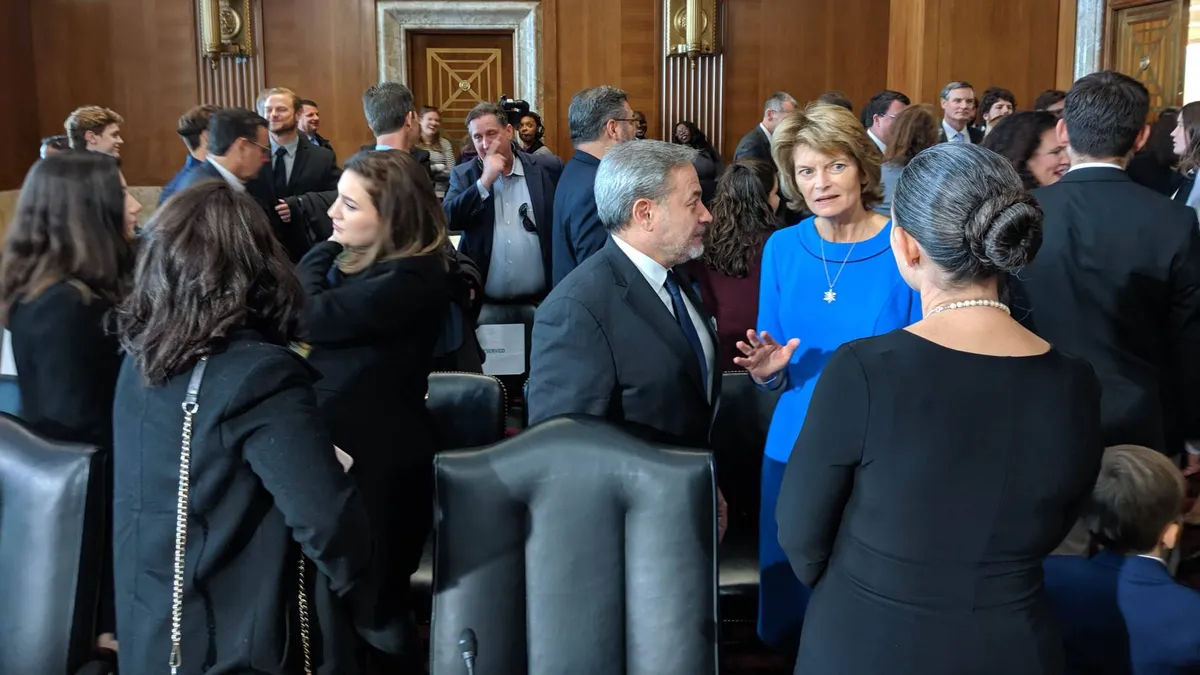UPDATE: Dec. 3, 2019: The senate approved the nomination of Dan Brouillette with a 70-15 vote on Monday.
Dive Brief:
-
The Senate Energy and Natural Resources Committee grilled Department of Energy Deputy Secretary Dan Brouillette, the nominee to replace outgoing Secretary Rick Perry, about any potential ties to Ukraine as well as his commitment to baseload power at a Thursday confirmation hearing.
-
Brouillette denied any knowledge of alleged communications between Perry and high-level Ukrainian officials about the board composition of a state-owned Ukranian natural gas company. Perry announced his resignation on Oct. 17 after reports of the communications entangled him in ongoing congressional proceedings to impeach President Donald Trump.
- The nominee was also pressed to define his "all of the above" energy resources strategy, specifically whether his approach would include federal protections for facilities such as the Montana Colstrip plant.
Dive Insight:
Perry was dragged into the presidential impeachment inquiry following reports that he was involved in a phone call between President Trump and Ukrainian President Volodymyr Zelensky regarding a natural gas plant. He announced his resignation on Oct. 17 — despite previously denying reports that he intended to leave the department — after House Democrats subpoenaed him on the issue.
Sen. Ron Wyden, D-Ore., quizzed Brouillette on his knowledge of any communications between the DOE and Ukrainian officials at the hearing. Brouillette said he was aware of occasional meetings between Perry and individuals who were involved with restructuring the state-owned enterprise; however, he added, he was not aware of any conversations between Perry and Trump's personal lawyer Rudy Giuliani, or with members of the Ukrainian government over the company's advisory board.
Brouillette repeatedly emphasized the administration's emphasis on an "all of the above" energy strategy, saying that diversity in supply would ensure energy security for the U.S. and its foreign allies. Producing energy from all available sources would remain essential until battery storage technologies are scaled up to the grid level, he added.
"It is important that baseload power exists because without it, if we are, I think, objective and candid, the adoption of renewables or the introduction of renewables into our electric grid is just very, very difficult," he said.
The issue of baseload power has received intense public scrutiny over the last two years, after the DOE's 2017 directive to the Federal Energy Regulatory Commission to open a "resilience" rulemaking that would provide cost recovery to power plants with an on-site, 90-day fuel supply. The move was widely criticized by analysts, who were concerned that it could saddle customers with additional costs. FERC rejected the Notice of Proposed Rulemaking in January.
Ensuring fuel security units is a concern for many Americans and will continue to be a priority for the DOE, Brouillette told reporters after the hearing. However, the strategy is "not about saving the plants," he added.
"It's about looking at the entirety of the grid, looking at the entirety of the energy sector and making sure that we don't have either distortions or artificial impacts on it that might preclude us from either an adoption of a renewable technology or create some level of security risk," he told reporters.
By contrast, he told Senators at the hearing that it is important for facilities like the Colstrip plant to remain online until issues related to the adoption of renewables are addressed. Brouillette's statements came in response to Sen. Steve Daines, R-Mont., who quizzed him on possible protections for the facility to maintain Montana's "balanced energy portfolio." The plant's premature closure could threaten this balance, Daines said, cutting over 600 MW of baseload power and affecting the livelihoods and tax base of the local community.
Two of the Colstrip plant's four units are slated to retire at the end of the year. In April, Montana lawmakers struck down legislation referred to as the "Save Colstrip" bill that would have allowed NorthWestern Energy to buy 150 MW more from the plant.
Senate Energy and Natural Resources Chair Lisa Murkowski, R-Alaska, said she intends to move Brouillette's nomination through the committee process as rapidly as possible to enable "a seamless transition" after Perry's departure on Dec. 1.
CORRECTION: A previous version of this story misstated the date that two units of the Colstrip plant are scheduled to retire. They will be shut down by the end of 2019.















